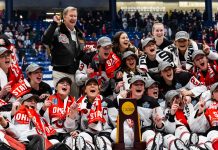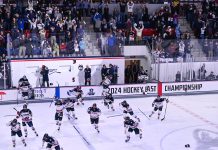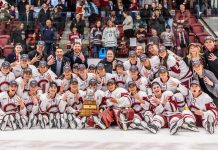In March, after winning the CCHA 2002-03 regular-season title, the surprising Ferris State Bulldogs lost the Super Six Championship game to the Michigan Wolverines in a 5-3 decision. Assured of an NCAA berth with 31 wins, the Bulldogs were miserable.
“We really wanted this,” said FSU head coach Bob Daniels. “For us, the NCAA tournament was really an afterthought.”
In contrast, after capturing their second straight Mason Cup, the Wolverines seemed almost to take the title in stride, not merely because of their repeat performance but because they were anticipating bigger fish to fry.
“You want to win a championship whenever you get the chance,” said senior Wolverine Jed Ortmeyer. “Hopefully this will help us out in the PairWise, but we definitely wanted to win our league championship to start our NCAA run.”
The PairWise. Their NCAA run.
It’s October, and it’s a fair question: Has the regular season in Division I hockey lost its meaning?
When the CCHA coaches gathered for the league’s media day, certainly there were nods to the tough competition within the league and to the long campaign that lay ahead. Western Michigan head coach Jim Culhane said that the Broncos were looking to how their seniors “can help through a very challenging CCHA season.”
Northern Michigan’s Walt Kyle said, “We’re excited about the groups of guys coming in. We’re excited about the chemistry these guys have developed and we want to get the season going.”
Mike Kemp, the Nebraska-Omaha skipper, said that the season-opening Maverick Stampede “will certainly be a challenging start for our team and we look forward to the battles through a very exciting CCHA season.”
While some coaches discussed how difficult it is to compete in the CCHA, parity received far little lip service this season than it has in the past and there were more than a few comments about the need to show well against nonleague opponents.
Yes, each coach expected to be competitive. Yes, each coach looked forward to seeing his team take the ice. But no one mentioned the Super Six. No one talked about the Mason Cup.
And the subcurrent through the day was not parity, not the cluster system, not the Super Six.
The CCHA has clearly become too small a pond.
Scott Paluch, who enters his second season at Bowling Green, said that the Falcons are counting on “returning players to compete nationally.” He added, “All the teams here wish to … compete on the national level.”
The coach who was most pointed about what the season means was Ohio State’s John Markell, whose comments are perhaps as much a reflection of the philosophy of the program that just won a national championship in football as they are of a coach in the CCHA.
“Our job here is to try to maintain the top four,” said Markell, “do well in the playoffs, and make the Frozen Four.”
Thank goodness for Lake Superior’s Frank Anzalone, who deliberately provided the levity to put things in perspective. “Personally I only have one goal this year for myself and my wife is part of this. My goal is to get in the top six in the best-dressed coaches of the league. I started off today middle-line dressing, get everybody’s expectations down, but from January on I’m going to wear some nice looking suits and get in the top six.”
And thank goodness for the Lakers, who — prior to last year’s regular-season winner, Ferris State — were the only team other than Michigan or Michigan State to win the regular-season championship in the past decade, doing so in 1995-96. Miami won in 1992-93, and you have to go back to 1986-87 to find someone other than the Wolverines, the Spartans, the RedHawks (nee Redskins), or Lakers at the top of the regular-season standings. That was the last year that Bowling Green finished first.
Is the dominance of Michigan and Michigan State the reason for the tone of the preseason rhetoric? Has winning the CCHA regular season and Super Six titles become so routine for these dominant programs that the stakes have become higher for them and so, naturally, for the rest of the teams in the league?
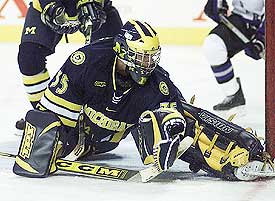
Only two teams in the league have winning records in NCAA tournament play, Michigan (21-13-0) and Lake Superior State (20-11-1). The Wolverines have appeared in the last three Frozen Fours, while the Lakers have been struggling to return to form for many years.
The Spartans, 20-23-1 in NCAA postseason play, have been overshadowed in the past decade by the performance of their archrivals in Ann Arbor, so if they looked beyond the regular season to the NCAA tourney — and MSU head coach Rick Comley did not make such comments at the start of the season — they can perhaps be forgiven.
Since 1990, the CCHA has captured four national titles, two each for Michigan and Lake Superior. MSU and OSU have also represented the league in the Frozen Four, but Michigan has been the CCHA’s NCAA postseason mainstay for the majority of head coach Red Berenson’s tenure.
Given Michigan’s dominance in the CCHA, given how difficult regular-season titles are to come by if your school’s name doesn’t include the word “Michigan,” and given the league’s NCAA tournament performance, wouldn’t it be great if someone were to approach the season enthusiastically with the goal to capture the CCHA crown?
Thank goodness for Bob Daniels. “First and foremost, we want to do well in our league. I guess that’s the respect we have for the league. At no time last year did we even care about the NCAA tournament. All we cared about was doing well in the league.
“It won’t be any different this year. There are plenty of good teams to worry about in our own league.”
Going into the 2003-04 season, the CCHA can be broken down into four distinct groups. Bowling Green, Lake Superior State, and Nebraska-Omaha comprise Group One. All three teams are rebuilding and will likely finish near the bottom of the regular-season standings.
Group Two consists of five teams — Alaska-Fairbanks, Ferris State, Michigan State, Northern Michigan, and Ohio State — who are fairly solid and easy to understand, teams whose regular-season chances will be defined not just by their individual pools of talent, but by scheduling, injuries, clusters, and a certain amount of serendipity. Four of those five teams will probably earn home ice in the first round of the CCHA playoffs.
Group Three is populated by three teams — Miami, Notre Dame, and Western Michigan — who seem incomprehensible, texts that are either written in unrecognizable languages or with invisible ink. It is difficult to gauge their progress under their current coaches, let alone predict where each will finish. Any one of these teams has the potential to finish very high; every one of these teams can bottom out.
Group Four is Michigan.
And so the season begins with potential, optimism, expectations. “Every coach is excited by the off-ice chemistry this year,” says Notre Dame head coach Dave Poulin. “We’re all very anxious to see where that chemistry translates in the locker room and on the ice.”
Here’s a look at each team in order of predicted finish. Click on a given team’s name to read the full preview, hook, line, and sinker.
Head coach: Red Berenson, 20th season
2002-03 record: 30-10-3, 18-7-3 CCHA
2002-03 CCHA finish: second
Predicted ceiling/basement: first/third
The bait: The Wolverines may have been surprised by Ferris State’s first-place finish last season, but when it counted Michigan was the only CCHA team to show, truly. Reflecting on last year’s regular-season final standings, Berenson said, “I’ve always thought there was going to be a surprise in our league; maybe it shouldn’t or won’t be a surprise this year.” What should come as no surprise to anyone is that Michigan is the league’s preseason favorite, and even the ever-understated Berenson sees the logic in that. “Somebody has to be picked first and I suppose it may as well be us.”
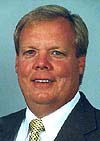
Head coach: Bob Daniels, 12th season
2002-03 record: 31-10-1, 22-5-1 CCHA
2002-03 CCHA finish: first
Predicted ceiling/basement: first/sixth
The bait: Daniels is the nicest guy in college hockey, a guy so far from a being a braggart that when he talks up his own team — even modestly — you’d better believe he’s got something to say. “It is a tough league. We could easily go down. I know this though: talent-wise, we have the ability to have a very good season.”
Head coach: Rick Comley, second season at MSU, 28th year overall
2002-03 record: 23-14-2, 17-10-1 CCHA
2002-03 CCHA finish: fourth
Predicted ceiling/basement: second/sixth
The bait: It took half a season, but Comley finally had the Spartans convinced that they could score goals, and that gave the rest of the league a glimpse of how dangerous MSU can be. How will Comley follow up his “rookie” season? “For me, it’s like night and day from a year ago. I can even sit up here and talk about players, and know them, and hopefully when the game starts and I yell at somebody on the ice, they’re not tugging my pant leg on the bench because they’re sitting beside me, rather than out there.”
Head coach: John Markell, ninth season
2002-03 record: 25-13-5, 16-8-4 CCHA
2002-03 CCHA finish: third
Predicted ceiling/basement: second/sixth
The bait: Goodbye Ryan Kessler. Goodbye RJ Umberger. The Buckeyes struggled to find the net last season and the early departure of two of their top four scorers doesn’t bode well for OSU, but Markell would like to remind you that his squad is more than the sum of those big guns. “When we get down to the backbone of our team, I think it’s going to be Mike Betz. Our goaltending duo I think is comparable to none in the CCHA.” Goaltending duo? Enter Dave Caruso.
Head coach: Walt Kyle, second season
2002-03 record: 22-17-2, 14-13-1 CCHA
2002-03 CCHA finish: fifth (tie)
Predicted ceiling/basement: second/sixth
The bait: The Wildcats lost seven valuable seniors at the end of last season, and would-be sophomore and third-round draft pick defenseman Juha Alen jumped ship as well. This leaves NMU with questions about scoring, defense, and leadership. “Time is going to tell which individuals are going to emerge … for us,” said Kyle. “We’re excited about the groups of guys coming in. We’re excited about the chemistry these guys have developed and we want to get the season going.”
Head coach: Enrico Blasi, fifth season
2002-03 record: 21-17-3, 13-12-3 CCHA
2002-03 CCHA finish: fifth (tie)
Predicted ceiling/basement: fifth/eighth
The bait: The RedHawks came out of the gate on fire last season, compiling a 12-3-2 record for October and November 2002, but Miami couldn’t sustain the pace through the remainder of the season. Ultimately, the RedHawks lost their first-round CCHA playoff series at home, bested by Notre Dame in three games. This year, Miami returns 80 percent of its offense, 100 percent of its defense, and zero percent of its goaltending. “We return all of our defensemen from a year ago, which is a good thing for us because we have three young goalies who are unproven.”
Head coach: Guy Gadowsky, fifth season
2002-03 record: 15-14-7, 10-11-7 CCHA
2002-03 CCHA finish: ninth
Predicted ceiling/basement: sixth/ninth
The bait: UAF is one of two senior-heavy teams, the other being OSU. The Nanooks return 19 lettermen, and that may be the missing link for this team that was so promising just two seasons ago. Said Gadowsky, “I think the difference between this year and the last two seasons is the strength of our senior class. I think that can be a big difference in the CCHA, not only in terms of experience, but also in leadership.”
Head coach: Dave Poulin, ninth season
2002-03 record: 17-17-6, 13-12-3 CCHA
2002-03 CCHA finish: fifth (tie)
Predicted ceiling/basement: sixth/11th
The bait: Notre Dame fans are eager to witness that chemistry of which Poulin spoke at the league’s media day. Given the number of draft picks that have come through this program in recent years, you’d think that Notre Dame would be a contender by now. Maybe the key ingredient this year for the Irish is veteran leadership. “Our leadership and energy,” said Poulin, “comes from Aaron Gill, who is a coach’s dream and looks after things in the locker room.”
Head coach: Scott Paluch, second season
2002-03 record: 8-25-3, 5-20-3 CCHA
2002-03 CCHA finish: 11th
Predicted ceiling/basement: seventh/12th
The bait: For Paluch, who seemed to have inherited a dispirited team, success wasn’t measured by win percentage in 2002-03, but by the satisfaction his players had knowing they did the best their best. He expects that to continue through this coming year. “We’ve had a great off-season. The players are excited. Last year our wins and losses weren’t where we wanted to be or where the tradition of the school puts us, but we have a lot of differences this year starting with the type of work ethic we bring to the game very practice, every game.”
Head coach: Jim Culhane, fifth season
2002-03 record: 15-21-2, 13-14-1 CCHA
2002-03 CCHA finish: eighth (tie)
Predicted ceiling/basement: eighth/11th
The bait: At the league’s media day, Culhane spoke about WMU’s centennial celebration, the university’s new president, the new jerseys the Broncos will sport, and the team’s unusual schedule. Very little was said about the team itself, a squad that had as much talent for allowing goals as scoring them last season. “We get leadership from our senior class on the ice as well as in the classroom. Throughout the course of the year, as we go through our hockey season, seeing where they can help through a very challenging CCHA season, we look forward to a great year.”
Head coach: Mike Kemp, seventh season
2002-03 record: 13-22-5, 9-17-2 CCHA
2002-03 CCHA finish: 10th
Predicted ceiling/basement: 10th/12th
The bait: The the likes of Dan Ellis, Greg Zanon, and David Brisson anchoring the Mavericks, 10th place wasn’t where UNO expected to finish at the end of the 2002-03 season. After taking his team to The Joe in 2000 and 2001 and losing a first-round CCHA playoff series in three games to Notre Dame in 2002, head coach Mike Kemp minced no words about last season’s Mavericks. “Certainly, we underachieved last year tremendously, and we’re very, very disappointed with that. I think that’s why we won’t make the same mistake.”
Head coach: Frank Anzalone, 11th overall and third this stint
2002-03 record: 6-28-4, 3-24-1 CCHA
2002-03 CCHA finish: 12th
Predicted ceiling/basement: 10th/12th
The bait: In his first two seasons back at Lake Superior State, Anzalone made more than just a few controversial comments on the record about his predecessor, about the talent on his team, about his team’s performance on a given night. This year, Anzalone’s focus is Anzalone. “This season I have to do a better job as a coach. I don’t think I have done very well in my two years at Lake Superior. I think now I have my feet on the ground in terms of what I have to do as a hockey coach at this level.”
